Key Takeaways
- Understand your terrain: Assess the slope type (graded or steep) to determine the best fencing solution.
- Fence design matters: Step-down, rackable, and contoured fencing are ideal for sloped properties.
- Material selection: Choose durable and adaptable materials like vinyl, wood, aluminum, or chain-link.
- Erosion control: Proper drainage and erosion prevention are critical for long-term fence stability.
- Privacy and security: Enhance your property with custom fencing solutions tailored to your needs.
Choosing the Right Fence Design for a Secure Installation
Fencing on slopes requires careful planning, as the incline affects design and installation. Whether for privacy, security, or aesthetics, choosing the right fence for a sloped yard is essential. The terrain influences which fence type works best, so understanding these challenges helps in making an informed decision.
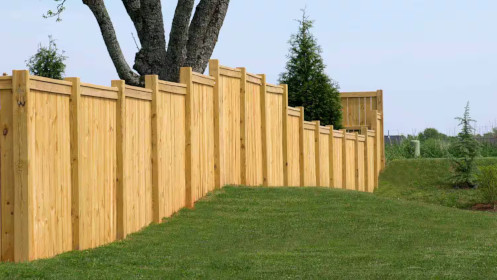
In New Zealand, where rolling hills are common, sloped fencing is a key concern for homeowners. The right fence can enhance both function and appearance while addressing erosion control and drainage. With various materials and designs available, you can find a solution that suits your budget and style. This guide covers essential considerations for fencing on sloped properties.
Understanding the Terrain
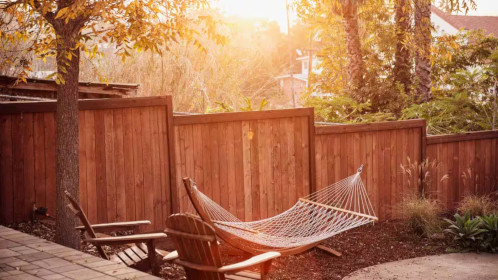
Before installing a fence, it’s essential to evaluate the slope of your property. Slopes can range from gentle inclines to steep hillsides, and each requires a different approach.
The type of slope you’re working with will influence not only the design of the fence but also the materials and installation techniques required to ensure stability and functionality. Properly assessing the terrain is the foundation for a successful fencing project, as it allows you to address potential challenges like uneven ground, erosion, and drainage issues upfront.
Types of Slopes
| Slope Type | Description | Recommended Fence Design |
|---|---|---|
| Graded slope | Gentle incline, easier to work with | Step-down or rackable fencing |
| Steep slope | Sharp incline, requires structural care | Contoured or custom-built fencing |
To measure your slope, use a level or consult a professional for an accurate assessment. This will help you choose a fence design that accommodates the terrain effectively.

Understanding the slope’s impact on water flow and soil stability is critical. For example, steep slopes may require additional reinforcement, such as deeper fence posts or erosion control measures, to prevent shifting or instability over time. By taking the time to thoroughly evaluate your property’s slope, you can ensure that your fence will not only look great but also stand the test of time.
Key Considerations for Fencing on Slopes
Fence Materials
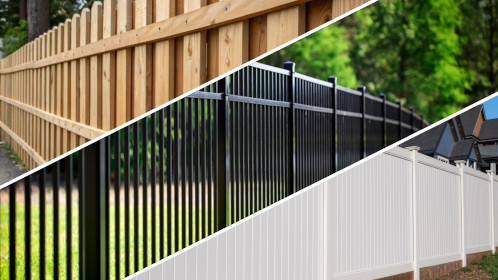
Choosing the right material for your fence for a sloped yard is one of the most important decisions when installing fencing on a slope. Each material offers unique benefits and challenges, and exploring different slope ideas for your backyard can help determine which option best suits your needs and complements your landscape.
- PVC fencing is a popular choice for its low-maintenance nature and adaptability to uneven terrain, making it ideal for homeowners seeking a hassle-free solution.
- Wood fencing, on the other hand, provides a timeless, natural aesthetic and can be customized to fit the slope, but it requires regular upkeep to maintain its appearance and structural integrity.
- Aluminum fencing is lightweight, durable, and particularly well-suited for steep slopes, as it can withstand harsh weather conditions and resist corrosion.
- Chain-link fencing is the most affordable option and works well for functional purposes, but it may lack the privacy and visual appeal of other materials.
When selecting a material, consider factors like durability, cost, and how well it complements the overall look of your property.Key factors to consider when selecting a fencing material, including advantages and challenges:
| Material | Advantages | Challenges |
|---|---|---|
| PVC | Low maintenance, adaptable to slopes | Higher upfront cost |
| Wood | Traditional look, customizable | Requires regular upkeep |
| Aluminum | Durable, lightweight, ideal for steep slopes | May be more expensive than chain-link |
| Chain-link | Affordable, practical | Limited privacy and aesthetic appeal |
Fence Design
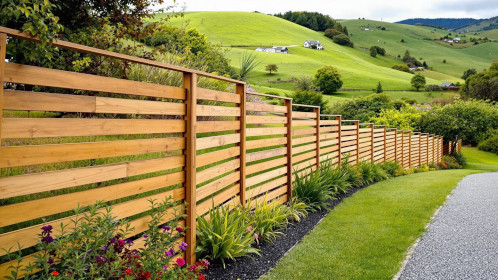
The design of your fence determines how well it integrates with the slope.
- Step-Down Fencing: Ideal for gentle slopes, this design uses level sections that step down incrementally.
- Rackable Fencing: Panels tilt to match the incline, creating a smooth, continuous look.
- Contoured Fencing: Follows the natural grade of the land, perfect for steep slopes.
Gate Placement and Operation
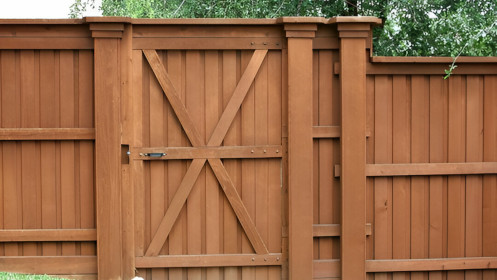
Installing gates for fences on sloped properties requires careful consideration to ensure they function properly and complement the overall fence design. Sliding gates are an excellent option for sloped driveways, as they eliminate the need for swinging gates that may struggle to open and close on uneven ground. Adjustable hinges can also be used to accommodate the incline, allowing gates to swing smoothly without dragging or misaligning. For steep slopes, custom-built gates are often the most practical solution, as they can be tailored to the specific angle and dimensions of your property.
It’s important to consider the placement of the gate to ensure easy access and proper alignment with the rest of the fence. Whether you’re installing a gates for fences for a driveway, walkway, or backyard entrance, investing in a design that works with the slope will save you time and frustration in the long run.
Erosion Control and Drainage Considerations
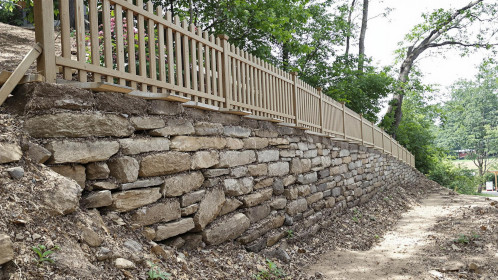
Managing erosion and drainage is a critical aspect of fencing on sloped properties, as improper handling can lead to soil displacement, water pooling, and compromised fence stability. Slopes are naturally prone to erosion, especially during heavy rainfall, which can weaken the ground around fence posts and cause structural issues over time.
To mitigate these risks, it’s essential to implement erosion prevention measures such as retaining walls, ground cover, and proper grading. Retaining walls help stabilize the soil and prevent it from shifting downhill, while ground cover like plants or mulch reduces soil displacement and improves water absorption. Grading the land ensures that water flows away from the fence line, minimizing the risk of pooling and erosion. Effective drainage solutions, such as French drains or permeable materials, can redirect water flow and prevent moisture buildup near the fence. By addressing erosion and drainage proactively, you can protect your fence and maintain the integrity of your property.
Erosion Prevention
Preventing erosion is key to maintaining fence stability. Retaining walls stabilize soil, ground cover reduces displacement, and proper grading ensures water flows away from the fence line, protecting its foundation.
- Retaining walls: Install retaining walls to stabilize the soil and prevent erosion.
- Ground cover: Use plants or mulch to reduce soil displacement.
- Grading: Ensure proper grading to direct water away from the fence line.
Drainage Solutions
Effective drainage prevents water damage to fences. French drains redirect water flow, while permeable materials like gravel improve absorption and reduce pooling near fence posts.
- French drains: These can redirect water flow and prevent pooling near fence posts.
- Permeable materials: Use gravel or permeable pavers to improve water absorption.
Proper erosion control not only protects your fence but also enhances the overall health of your property.
Security and Privacy Enhancements
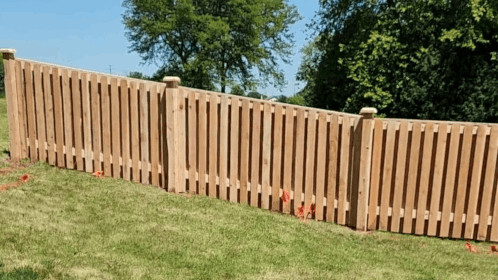
Fencing on sloped terrain can be tailored to meet specific security and privacy needs, ensuring both functionality and peace of mind. Privacy fencing on uneven ground requires careful adjustments to maintain a consistent height, preventing gaps that could compromise coverage. Solid materials like wood or PVC are ideal for creating a barrier that blocks visibility and enhances privacy, even on challenging slopes.
For security purposes, durable materials such as aluminum or metal are excellent choices, as they offer strength and resistance to environmental stressors. Custom designs can further enhance security by incorporating features like spikes, reinforced panels, or locking mechanisms that deter intruders. By combining thoughtful design with high-quality materials, fencing on slopes can effectively provide both privacy and protection, while seamlessly blending with the landscape.
Privacy Fencing
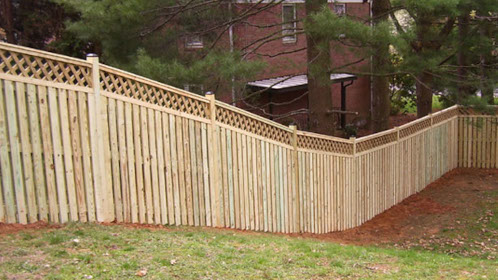
Maintaining consistent fence height on slopes is crucial for privacy. Solid materials like wood or PVC ensure full coverage, blocking visibility and enhancing seclusion.
- Height adjustments: Ensure consistent fence height on uneven ground for maximum privacy.
- Material choice: Opt for solid materials like wood or PVC for better coverage.
Security Features
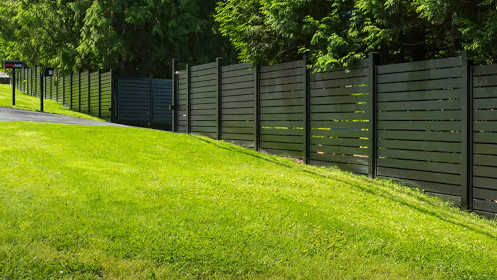
Durable materials like aluminum or metal are ideal for secure fencing on slopes. Custom features, such as spikes or reinforced panels, add extra protection against intruders.
- Durable materials: Aluminum and metal fences are ideal for secure fencing on inclines.
- Custom designs: Incorporate features like spikes or reinforced panels for added protection.
Custom fencing solutions can be tailored to meet your specific needs, whether you’re securing a residential property or enhancing privacy.
Best Fencing Options for Sloped Properties
PVC Fencing
PVC is a versatile and low-maintenance option for sloped properties. It can be installed using step-down or rackable designs, making it adaptable to various terrains.
Wood Fencing
Wood offers a natural aesthetic and can be customized to fit the slope. Contoured or rackable wood fences are ideal for steep inclines, though regular maintenance is required.
Aluminum Fencing
Aluminum is lightweight, durable, and perfect for steep slopes. It provides a sleek look and requires minimal upkeep, making it a popular choice for secure fencing on hills.
Chain-Link Fencing
Chain-link fences are affordable and practical, especially for security purposes. While they may lack privacy, they can be enhanced with privacy slats or landscaping.
Professional Installation vs. DIY
Installing a fence on sloped terrain presents unique challenges that often go beyond the scope of a typical DIY project. Achieving proper alignment, stability, and functionality on uneven ground requires technical expertise and specialized tools. While DIY installation may seem like a cost-effective option, mistakes such as improper grading, misaligned posts, or inadequate drainage can lead to structural issues, costly repairs, and reduced fence lifespan.
As professional fence contractors, we bring years of experience and knowledge to the table, ensuring that our fences are installed correctly the first time. We offer tailored solutions to meet the specific needs of your property, whether it’s addressing steep slopes, enhancing security, or improving privacy. With our expertise, you can trust that your fence will be durable, aesthetically pleasing, and built to withstand the challenges of sloped terrain. Contact us today to ensure your fencing project is handled with precision and care, saving you time, effort, and potential headaches.
Benefits of Professional Installation
- Expertise: We understand the complexities of fencing on slopes.We understand the complexities of fencing on slopes.
- Durability: Our proper installation ensures long-lasting results.
- Customization: We provide tailored solutions for unique property needs.
Professional installers understand the complexities of fencing on slopes, ensuring durability and customized solutions for your property. Contact Real Fencing for expert assistance and long-lasting results.
Cost Considerations
The cost of fencing on slopes depends on factors like materials, design, and installation.
| Cost Factor | Description |
|---|---|
| Material | PVC and aluminum are more expensive than wood or chain-link. |
| Design complexity | Contoured and custom-built fences may increase costs. |
| Installation | Professional installation adds to the overall expense. |
Requesting a fence installation consultation can help you estimate costs and plan your budget effectively.
Conclusion
Fencing on slopes requires careful planning and consideration of terrain, materials, and design. By addressing erosion control, privacy, and security, you can create a functional and visually appealing fence that enhances your property.
Ready to transform your sloped yard? Contact Real Fencing for expert advice and professional installation services.
FAQs About Fencing on a Sloped Property
Can you put a fence on a slope?
Yes, you can install a fence on a slope, but the process requires careful planning to ensure the fence is both functional and visually appealing. The two most common methods for installing fencing on a slope are the stepped fence and the racked fence. A stepped fence features level sections that drop down in steps, making it ideal for a gradual slope. A racked fence, on the other hand, follows the natural slope of the land, providing a smooth and continuous look.
When installing fencing on a slope, it’s essential to take proper measurement of the yard’s slope to determine the best installation method. Depending on the type of fence you choose, adjustments may be necessary to ensure the fence remains stable and aesthetically pleasing. Hiring a company with experience in sloped fencing can help avoid issues like gaps at the bottom of the fence or instability over time.
What is the best fence for a slope?
The best type of fence for a sloped yard depends on your needs, budget, and the terrain. For a wood privacy fence, both stepped wood fences and sloping wood fences work well, depending on whether you prefer a uniform height or a fence that follows the natural slope. A sloping metal fence, such as an iron fence, is another durable option that can be installed with either a stepped wire fence or a racked design.
If erosion is a concern, a fence with a retaining wall can provide extra stability and prevent soil displacement. The style of fence you choose should complement your landscape while also serving its intended function, whether it’s for privacy, security, or aesthetics. Consulting a professional can help in choosing the right fence design for your specific property.
How do you make a fence look good on uneven ground?
A beautiful and functional fence on uneven ground starts with selecting the right design. A racked fence creates a seamless appearance by following the slope, while a stepped fence maintains a level top edge but requires careful height adjustments. To enhance the look, consider a fence using high-quality materials, such as stained wood or decorative metal panels, that complement your landscape.
Landscaping can also improve the appearance of a fence on a sloped yard. Adding plants, retaining walls, or stone borders around the base can help blend the fence into the environment. Whether you’re building a fence for aesthetics or function, working with an expert ensures that your fence is a great addition to your yard.
Not sure if a sloped fence is right for your property or if it’s within your budget?
If you’re unsure whether a fence for your property is the right investment, consider how it will enhance security, privacy, and property value. A functional fence that complements the landscape can provide long-term benefits, such as preventing soil erosion and marking property boundaries. Various fence options are available, ranging from budget-friendly chain-link fences to high-end wood privacy fences or iron fences.
Cost varies based on factors such as the height of the fence, the materials used, and the complexity of the fence is built on a slope. A professional company can provide cost estimates and help explore slope ideas for your backyard, ensuring you get the best value while staying within budget.

0 Comments